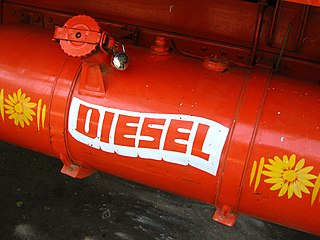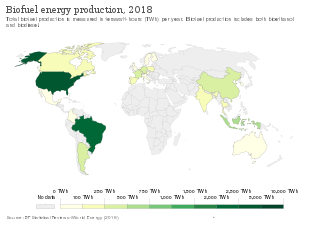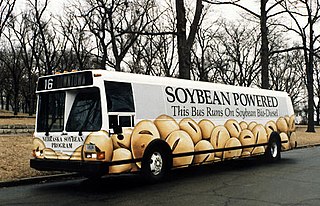Related Research Articles

Palm oil is an edible vegetable oil derived from the mesocarp of the fruit of the oil palms, primarily the African oil palm Elaeis guineensis, and to a lesser extent from the American oil palm Elaeis oleifera and the maripa palm Attalea maripa.

Diesel fuel in general is any liquid fuel used in diesel engines, whose fuel ignition takes place, without any spark, as a result of compression of the inlet air mixture and then injection of fuel. Diesel engines have found broad use as a result of higher thermodynamic efficiency and thus fuel efficiency. This is particularly noted where diesel engines are run at part-load; as their air supply is not throttled as in a gasoline (petrol) engine, their efficiency still remains very high.

A biofuel is a fuel that is produced through contemporary processes from biomass, rather than a fuel produced by the very slow geological processes involved in the formation of fossil fuels, such as oil. Since biomass technically can be used as a fuel directly, some people use the terms biomass and biofuel interchangeably. More often than not, however, the word biomass simply denotes the biological raw material the fuel is made of, or some form of thermally/chemically altered solid end product, like torrefied pellets or briquettes.

Biodiesel is a form of diesel fuel derived from plants or animals and consisting of long-chain fatty acid esters. It is typically made by chemically reacting lipids such as animal fat (tallow), soybean oil, or some other vegetable oil with an alcohol, producing a methyl, ethyl or propyl ester.
Biodiesel production is the process of producing the biofuel, biodiesel, through the chemical reactions of transesterification and esterification. This involves vegetable or animal fats and oils being reacted with short-chain alcohols. The alcohols used should be of low molecular weight. Ethanol is the most used because of its low cost, however, greater conversions into biodiesel can be reached using methanol. Although the transesterification reaction can be catalyzed by either acids or bases, the base-catalyzed reaction is more common. This path has lower reaction times and catalyst cost than those acid catalysis. However, alkaline catalysis has the disadvantage of high sensitivity to both water and free fatty acids present in the oils.

Willie Nelson Biodiesel is an American company started by singer-songwriter Willie Nelson, that produces biofuel under the brand name BioWillie. Nelson became interested in biofuels in 2004 after his wife bought a diesel car, which she fueled only with biodiesel. They were impressed by the efficiency and performance of the biofuels and their potential to end the dependence of the United States on foreign oil sources, as well as to provide the family farmers with work to produce it. The same year, he and his wife became partners with Bob and Kelly King in the building of two Biodiesel plants, one in Salem, Oregon and the other at Carl's Corner, Texas.

Camelina is a genus within the flowering plant family Brassicaceae. The Camelina species, commonly known as false flax, are native to Mediterranean regions of Europe and Asia. Most species of this genus have been little studied, with the exception of Camelina sativa, historically cultivated as an oil plant. Heinrich Johann Nepomuk von Crantz was the first botanist to use the genus Camelina in his classification works in 1762. As a way to reduce fossil fuel emissions, the US Navy tested a 50-50 mix of jet aviation fuel and biofuel derived from camelina seeds in 2010. A study published in December 2016 explained that the current low price of conventional kerosene-based jet fuel makes it cost-prohibitive for commercial airlines to use camelina-based jet fuel. The study said substantial government intervention would be one way to create a market for camelina, by combining 9 percent government subsidy on camelina crop production, with 9 percent tax on the conventional fuel.

The mustard plant is a plant species in the genera Brassica and Sinapis in the family Brassicaceae. Mustard seed is used as a spice. Grinding and mixing the seeds with water, vinegar, or other liquids creates the yellow condiment known as prepared mustard. The seeds can also be pressed to make mustard oil, and the edible leaves can be eaten as mustard greens.
Vegetable oil can be used as an alternative fuel in diesel engines and in heating oil burners. When vegetable oil is used directly as a fuel, in either modified or unmodified equipment, it is referred to as straight vegetable oil (SVO) or pure plant oil (PPO). Conventional diesel engines can be modified to help ensure that the viscosity of the vegetable oil is low enough to allow proper atomization of the fuel. This prevents incomplete combustion, which would damage the engine by causing a build-up of carbon. Straight vegetable oil can also be blended with conventional diesel or processed into biodiesel or bioliquids for use under a wider range of conditions.
EN 14214 is a standard published by the European Committee for Standardization that describes the requirements and test methods for FAME - the most common type of biodiesel.

This article describes the use and availability of biodiesel in various countries around the world.
Pongamia oil is derived from the seeds of the Millettia pinnata tree, which is native to tropical and temperate Asia. Millettia pinnata, also known as Pongamia pinnata or Pongamia glabra, is common throughout Asia and thus has many different names in different languages, many of which have come to be used in English to describe the seed oil derived from M. pinnata; Pongamia is often used as the generic name for the tree and is derived from the genus the tree was originally placed in. Other names for this oil include honge oil, kanuga oil, karanja oil, and pungai oil.

Biofuel is fuel that is produced from organic matter (biomass), including plant materials and animal waste. It is considered a renewable source of energy that can assist in reducing carbon emissions. The two main types of biofuel currently being produced in Australia are biodiesel and bioethanol, used as replacements for diesel and petrol (gasoline) respectively. As of 2017 Australia is a relatively small producer of biofuels, accounting for 0.2% of world bioethanol production and 0.1% of world biodiesel production.
The biofuel policy of Malaysia is documented in Malaysia's National Biofuel Policy document.

Vegetable oils are increasingly used as a substitute for fossil fuels. Vegetable oils are the basis of biodiesel, which can be used like conventional diesel. Some vegetable oil blends are used in unmodified vehicles, but straight vegetable oil needs specially prepared vehicles which have a method of heating the oil to reduce its viscosity and surface tension. Another alternative is vegetable oil refining.
Boneyard is an American television program on The History Channel that documents places called boneyards, where old and retired vehicles, ships, aircraft, and other miscellaneous items are taken apart, and rebuilt to do other tasks or scrapped. It premiered on September 20, 2007.
Biodiesel is rapidly becoming more common in a number of developed countries and the environmental effects of using biodiesel either as a blend such as B20 or as a straight fuel stock may be different in various countries. This is because the allowable amounts of sulphur and other compounds vary from country to country. Additionally, the average temperature in a country will dictate the amount of biodiesel that can be blended into the fuel supply before the cold filter plugging point renders the fuel unusable. The national annex of BS EN 14214 specifies a maximum CFPP for B100 biodiesel of -15 °C in the winter and -5 °C for the rest of the year. As such, the benefits and disadvantages of biodiesel will vary from those in the United Kingdom.
ASTM D6751 details standards and specifications for biodiesels blended with middle distillate fuels. This specification standard specifies various test methods to be used in the determination of certain properties for biodiesel blends. Some of the tests mentioned include flash point and kinematic viscosity.
The environmental impact of biodiesel is diverse.

The use of biofuels varies by region. The world leaders in biofuel development and use are Brazil, United States, France, Sweden and Germany.
References
- ↑ "Biodiesel Magazine - The Latest News and Data About Biodiesel Production". biodieselmagazine.com. Retrieved 2016-10-19.